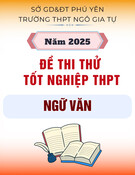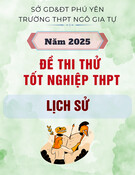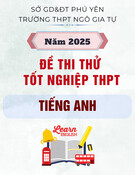
1/10
SỞ GIÁO DỤC VÀ ĐÀO TẠO
ĐỒNG THÁP
-------------------------------------------
KỲ THI CHỌN ĐỘI TUYỂN HỌC SINH GIỎI THPT
DỰ THI CẤP QUỐC GIA NĂM 2011
--------------------------------------------------------------------------------------------------------------------
ĐỀ THI MÔN: TIẾNG ANH
Thời gian làm bài: 180 phút (không kể thời gian phát đề)
Ngày thi: 18 tháng 11 năm 2007
(Đề thi gồm có: 08 trang)
Giám khảo 1
Giám khảo 2 Điểm bài thi Số phách
SECTION I: LISTENING COMPREHENSION (30 ps.)
Part 1: (10 ps.)
Read the statements below carefully. You will hear the director of a language school
talking to some students who have just arrived at the school. Fill in the gaps with the
missing information. Listen to the recording twice and spend 5 minutes to complete
your task.
1. Those students who have their surname beginning with H, their family will wait
for them in . . . . . . . . . . . . . . . . . . . . . . . . . . . . . . . . . . .
2. The introductory party is for all students to meet . . . . . . . . . . . . . . . . . . . . . . . . . .
3. The deadline for paying the school fees is after . . . . . . . . . . . . . . . . . . . . . . . . . . . .
4. If students have any problems about money, they can contact . . . . . . . . . . . . . . . .
5. Students’ meals are taken with their family, but if they want to have meal at
school, they have to come and see . . . . . . . . . . . . . . . . . . . . . . . . . . . . . . . . . . . . . .
Part 2: (20 ps.)
Read the statements below carefully. You will hear an interview on radio with
someone who started a news survey called Children’s Express. Decide if the
statements are True or False. Write T or F in the space provided on the right column.
You will hear the interview twice.
T/F
The purpose of Children’s Express is to encourage children to
consider important factors of the world.
1. . . . . . . . . . . .
In Children’s Express younsters can learn various kinds of job
including the job of journalists.
2. . . . . . . . . . . .
They learn to write articles and interview VIPs of the US. 3. . . . . . . . . . . .
Everything on newspapers and magazines reflects exactly the
content of the oral interviews.
4. . . . . . . . . . . .
The interviewer of the Radio station has good impression of the teenage
journalists’ work.
5. . . . . . . . . . . .
Đề chính thức

2/10
SECTION II: LEXICO-GRAMMAR (70 ps.)
Part 1: (50 ps.)
Choose the word which best completes the following sentences. Circle the letter of
your choice either A, B, C or D.
1. I can’t seem to get ……………. to him that he’s making a terrible mistake.
A. across B. over C.through D. off
2. They took …………… consideration the experience of each candidate before deciding
who to offer the job
A. into B. up C. after D. down
3. She wore on her expensive jewellry so that she could show ……………. how wealthy
she was.
A. on B. up C. off D. by
4. The boss is nice ……………. everyone else, but for some reasons he always pickking
……………. me.
A. with/up B. to/on C. by/on D. to/up
5. I had a similar experience ……………. yours last year, so I sympathise……………. you.
A. on/with B. in/for C. about/with D. for/with
6. We’ve……………of time to catch the train so there’s no need to run
A.very much B. enough C. plenty D. great deal
7. That’s …………….. . The bus is usually on time, so I’ve no idea why it’s late today.
A. unusual B. strange C. special D. uncustomary
8. I was so …………….. before the exams that I couldn’t sleep for two weeks.
A. worrying B. nervous C. shocked D. uncomfortable
9. Three years ago, there were two million people without jobs. Now there are over three
million …………….
A. unbusied B. workless C.jobless D. unemployed
10. I’m …………….. that something’s terrible going to happen if I’m not careful
A. scared B. feared C. threatened D. frightened
11. To end or…………………….. greatly pollution immediately, people have to stop using
many things that benefit them.
A. reduce B. decrease C. shorten D. lessen
12. Public transportation needs to be …………… in the next five years to serve the quick
development of the city.
A. repaired B. upgraded C. fixed D. improved.
13. He couldn’t …………his father that he was telling the truth.
A. confide B. trust C. convince D. admit
14. To practice a foreign language, it is best to …………… with native speakers of that language.
A. communicate B. contact C. inform D. give word
15. Einstein’s theories have …………… to the development of modern science
A. cooperated B. provided C. supplied D. contributed
16. Hamburgers, hot dogs, and fries are sometimes called junk ………………..
A. dishes B. meals C. food D. feed
17. Can you do me a(n)…………and post this letter
A. help B. promise C. aid D. favour
18. A fire fighter saved a family from burning to death. He received a …………… from the
city government.
A. medal B. award C. prize D. gift

3/10
19. Last year the potatoes harvest was very disappointing, but this year it looks as though we
shall have a better…………………..
A. result B. crop C. income D. outcome
20. The mechanic explained in great…………………. of how the car worked
A. detail B. clarity C. information D.example
21. Have you taken your ……………….. on our new flat?
A. safety B. protection C. assurance D. insurance
22. When the starter gave the ………………. all the competitors in the race began to run
round the track.
A. signal B. whistle C. shot D. horn
23. In developing countries where ¾ of the world’s ……………….. lives, women produce
more than half of the food.
A. population B. people C. dwellers D. inhabitants
24. The main attraction of the job was that it offered the …………….to do research.
A. possibility B. opportunity C. proposal D. prospect
25. Scientist have discovered a close ………………. between smoking and several serious diseases.
A. unifcation B. combination C. relation D. connection
Part 2: (20 ps.)
Each line of the following passage contains ONE mistake (grammar or spelling).
Identify the mistake and write the correct form in the space provided in the column on
the right. Number (0) has been done as an example.
Anybody running a company knows that a well-planned conference
can greatly improve the performance on that business.
(0). on of
The main reason for this is that it takes your employees away from
a daily work place and offers them somewhere fresh for a short time.
26. . . . . . . . . . . . . . .
So, unless the conference is well thought out it will not have the best
results and you will have wasted a great deal of money.
27. . . . . . . . . . . . . . .
The first step is find the right place. Can your employees easily
reach the conference center? It is near the railway station?
28. . . . . . . . . . . . . . .
Is it close to a good, fast road? Has it plenty of suitably parking space? 29. . . . . . . . . . . . . . .
If you are going to choose a hotel, and perhaps the hotel has cheaper rates
at weekends or, if it is a popular tourist area, midweek rates may be cheaper.
30. . . . . . . . . . . . . . .
Other requirement is food and drink. This is very an important issue. 31. . . . . . . . . . . . . . .
You know, breakfast is a time which people can relax before the day’s work begins,
32. . . . . . . . . . . . . . .
and you may not want a long break for lunch in the middle of the day. 33. . . . . . . . . . . . . . .
Buffet lunches are very popular for this reason. Then there is dinner,
that most employees consider a reward for a day’s hard work!
34. . . . . . . . . . . . . . .
However your needs, it is essential to think ahead if you want
a successful conference.
35. . . . . . . . . . . . . . .

4/10
SECTION III: READING COMPRHENSION
Part 1: (10 ps.)
You are going to read a magazine article about changing your life. Choose the most
suitable heading from the list A – H for each part (1 – 5) of the article. There is one
extra heading which you do not need to use. Numbers (0) & (6) are done as examples.
A. The number of cars in London has not fallen.
B. Traffic movement in London today is just as bad as it was in the past
C. There has been a decrease in certain types of traffic in London
D. Using a car in London continues to have advantages.
E. New developments have prevented improvements in traffic conditions London.
F. Little can be done to improve the traffic situation in London.
G. Travelling by other means of transport can be unpleasant.
H. Driving in London is getting worse.
F

5/10
Part 2: (10 ps.)
Reading the passage carefully and answer the questions. Write your answers in the
space provided:
Some waste is not dangerous. Often somebody will recycle it and do something useful with it.
You can break up old cars to get the metal, or make new glass from old bottles. But some
waste is toxic – it is very poisonous. In the USA, for example, factories dump – throw away-
265 million tons of toxic waste every year. How do you dump toxic waste safely? Well, you
can put it in metal containers and leave it somewhere safe; but this can be a very bad idea.
You can bury toxic waste. You put it in a deep hole and cover it with soil. That is what
happened at Love Canal in the USA. In the 1930s a chemical producer buried many tons of
toxic waste in metal containers. In 1950s, a builder bought the land and built a little town there.
Nobody remembered the containers of toxic waste under the ground. Then, in the 1970s, the
waste started to come through the metal of the containers and pollute the ground. Trees and
grass blackened and died. There was a bad smell everywhere. People had to leave their homes.
The people who cleaned up Love Canal found eighty-two different toxic chemicals in the soil.
You can burn toxic waste, but it is more expensive than burying it and the burning can produce
dangerous gases. So some people burn their toxic waste at sea in special ships The chemicals
get into the air and the wind carries them a long way.
You can send you toxic waste to a poorer country and pay somebody to burn or bury it there.
The USA sends toxic waste to Panama. Germany and Holland send toxic waste to the Czech
Republic. Is this a good idea?
Toxic waste can be useful if you know how to recycle it. Some producers bury their toxic
waste in the soil. There, special bacteria in the soil eat the waste and change it into clean, safe
carbon dioxide and water. In Britain, some people are growing special waste-eating bacteria.
These bacteria eat toxic chemicals. There is a lot of toxic waste in the world: Are these bacteria
hungry enough?
1. What message does the writer want to send to the readers of this passage?
. . . . . . . . . . . . . . . . . . . . . . . . . . . . . . . . . . . . . . . . . . . . . . . . . . . . . . . . . . . . . . . . . . . . . . . . . . . . . . . . . . . . . . . . . . . .
. . . . . . . . . . . . . . . . . . . . . . . . . . . . . . . . . . . . . . . . . . . . . . . . . . . . . . . . . . . . . . . . . . . . . . . . . . . . . . . . . . . . . . . . . . . .
2. According to the writer, why is burying toxic waste not a good idea?
. . . . . . . . . . . . . . . . . . . . . . . . . . . . . . . . . . . . . . . . . . . . . . . . . . . . . . . . . . . . . . . . . . . . . . . . . . . . . . . . . . . . . . . . . . . .
. . . . . . . . . . . . . . . . . . . . . . . . . . . . . . . . . . . . . . . . . . . . . . . . . . . . . . . . . . . . . . . . . . . . . . . . . . . . . . . . . . . . . . . . . . . .
3. What happens if we choose burning toxic waste in stead of burying it?
. . . . . . . . . . . . . . . . . . . . . . . . . . . . . . . . . . . . . . . . . . . . . . . . . . . . . . . . . . . . . . . . . . . . . . . . . . . . . . . . . . . . . . . . . . . .
. . . . . . . . . . . . . . . . . . . . . . . . . . . . . . . . . . . . . . . . . . . . . . . . . . . . . . . . . . . . . . . . . . . . . . . . . . . . . . . . . . . . . . . . . . . .
4. What does the writer imply when he puts the question “Is this a good idea?” in paragraph 3?
. . . . . . . . . . . . . . . . . . . . . . . . . . . . . . . . . . . . . . . . . . . . . . . . . . . . . . . . . . . . . . . . . . . . . . . . . . . . . . . . . . . . . . . . . . . .
. . . . . . . . . . . . . . . . . . . . . . . . . . . . . . . . . . . . . . . . . . . . . . . . . . . . . . . . . . . . . . . . . . . . . . . . . . . . . . . . . . . . . . . . . . . .
5. Do you think growing special waste-eating bacteria is the best solution to cope with
toxic waste on earth?
. . . . . . . . . . . . . . . . . . . . . . . . . . . . . . . . . . . . . . . . . . . . . . . . . . . . . . . . . . . . . . . . . . . . . . . . . . . . . . . . . . . . . . . . . . . .
. . . . . . . . . . . . . . . . . . . . . . . . . . . . . . . . . . . . . . . . . . . . . . . . . . . . . . . . . . . . . . . . . . . . . . . . . . . . . . . . . . . . . . . . . . . .


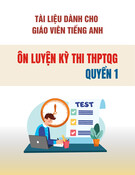
![Đề thi tiếng Anh tốt nghiệp THPT 2025 (Chính thức) kèm đáp án [mới nhất]](https://cdn.tailieu.vn/images/document/thumbnail/2025/20250627/laphong0906/135x160/9121751018473.jpg)

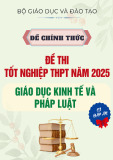
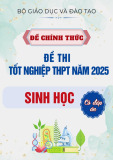


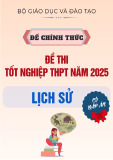
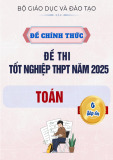

![11 chủ đề ôn tập môn Toán lớp 2 [chuẩn nhất]](https://cdn.tailieu.vn/images/document/thumbnail/2025/20250613/phuongnguyen2005/135x160/74791749803387.jpg)
